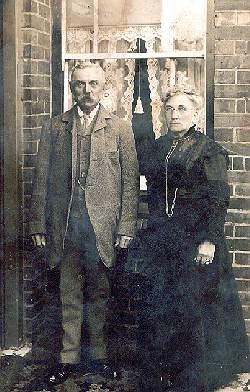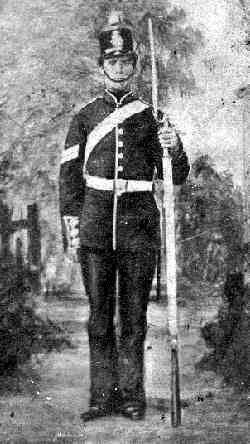|
Thomas
Jarvis - policeman and gamekeeper
(1844-1912)
Thomas Jarvis
began his working life as a gamekeeper but for some unexplained reason, when he was 31, he decided to join the police force. Furthermore, he did not enlist in the Lincolnshire Constabulary but chose instead to go to Yorkshire.
He already had some experience of a life in uniform having joined the Royal South Lincolnshire Militia when he was 23 and served from 1864 until 1869 and his records reveal that he was 5ft 9¼ in. tall with hazel eyes and a fresh complexion. He worked for a short time as under keeper at the Grimsthorpe Park estate but in July 1872, he moved to become gamekeeper for William Pochin,
who was at that time Lord of the Manor of Bourne Abbots with extensive land
holdings in the area and he remained in his employment until January 1875.
Jarvis may have been out of work for the next few months for
there is no record of his being employed and on 10th November 1875 he joined the
West Riding Constabulary as a constable, a decision that may have been motivated
by his wish to have a secure job.
His obviously made the right choice because subsequent records indicate that he had a successful career in the police force serving for 25 years until 31st December 1900 when he resigned on pension. He had obviously been an asset to the force because earlier, on 11th November 1883, he had been awarded a Certificate of Merit.
|
 |
 |
|
Thomas
Jarvis and his wife Catherine pictured outside the back door of
their home in Stanley Street, Bourne, and in the uniform of the Royal South Lincolnshire Militia,
circa 1868. |
He then moved back to Bourne and by 1904 was living at a house in North Road with his wife Catherine and had resumed his former occupation as a gamekeeper but working for the Marquess of Exeter who was then Lord of the Manor of Bourne, and his employment was mainly concerned with Bourne Wood which was then controlled by the Exeter Estate. The couple later moved to a house at No 2 Stanley Street which was his home when he died on Tuesday 15th October 1912, at the age of 68. Catherine survived him and died on 27th August 1926, aged 79. Both are buried in Bourne cemetery.
The circumstances of his death were reported in the Grantham Journal newspaper
on Friday 18th October 1912:
SUDDEN DEATH OF GAMEKEEPER AT BOURNE
On Wednesday afternoon, Dr Greenwood, Coroner for the Bourne District, held an inquest at the Town Hall, touching the death of Thomas Jarvis, a gamekeeper, who died suddenly whilst on duty in Bourne Wood the previous day. The following gentlemen comprised the jury: Messrs. T B Measures, R Oliver, J Mansfield, H A Gilbert, W Richards. A J Gant, T Leeson, R Lambert, W Fulcher, J H Robinson, J H Roberts, F Hodson, and J W Arnold. Mr E Nelson watched the proceedings on behalf of Mr E H Judge.
Harry Barnatt, son-in-law of the deceased, identified the body as that of Thomas Jarvis, who was sixty-six years of age [he was in fact 68]. Deceased lived at 2 Stanley-street, Bourne, and was employed as a gamekeeper by the Marquess of Exeter, at Bourne Wood. Witness had known the deceased for ten years, and he always appeared strong and healthy until the last six months. He lived next door to Jarvis, and frequently saw him. During the last six months, deceased had complained of pains in his head, and though his friends advised him to go to a doctor, he declined to do so.
Deceased kept at work up to last Monday, when he lay in bed the greater part of the day. He went to work on Tuesday morning about 9.30 a m, and complained to witness that he did not feel well. He looked pale and ill. That was the last time witness saw him alive. Deceased said that he was going to the chemist's for some medicine. Witness believed he went to Mr Judge's before going to work. In reply to a juryman, witness said he did not know deceased went out on Monday night.
Francis R Needham, woodman employed in Bourne Wood, residing at West Fields, Bourne, said deceased came to where he was working in Bourne Wood on Tuesday morning about 10.30. He was in company with a young man from Stamford whose name witness did not know. Deceased asked witness to accompany them round the wood, as he did not feel well, and thought he might have to give up before they got round. Deceased did get round, and saw the gentleman from Stamford leave just before one o'clock. When deceased rejoined witness it was dinner time, and the two walked together to get out of the wood, and after deceased had sat some few minutes on a tree stump. They had only walked about 200 yards when deceased exclaimed "Oh, dear!" and fell face downwards on the ground. Witness raised him up, and he died in witness's arms.
Witness saw that deceased looked bad when he sat on the tree stump. He had previously seen him looking ill, but not so bad, and when he raised deceased up he noticed that his face was very dark. Witness despatched a messenger to the friends of deceased. Edgar H Judge, chemist, of Bourne, gave evidence that he had known deceased for several years as a customer. To the best of his recollection Jarvis had never consulted him, and witness had not treated him for any illness. Witness last saw deceased on Tuesday morning, when he came to the shop and asked for something to relieve pains in the arms. Witness told deceased what he usually sold, and, at the request of deceased, witness made him up a mixture similar to that now produced.
Witness admitted that the bottle resembled the one he had supplied to deceased, but would not swear to its contents, as it had been through four hands since it left his. Witness added that he thought in such cases it would be best for the police to seal the bottle when it was found on a body over which an inquest was likely to be held. He considered such a course would be in the interest of the vendor and all other parties, and, if necessary, the contents could then be analysed. The Coroner did not think that any such course was necessary, as there was no suggestion of poisoning in this case.
In further reply to the coroner, witness said he did not notice that deceased looked ill, and he did not observe anything wrong with him. - Mr Measures agreed with the remarks of the witness as to the sealing of the bottle. The Coroner remarked that if there was anything suspicious in the matter it would be best to adapt that course. Mr Measures and several other jurymen all expressed the view that they agreed with witness to which the Coroner remarked that it was not usual; it was a matter for the police and he had no authority to give any orders in the matter.
Mr Judge asked the Coroner whose business it was to take the bottle from the deceased? The Coroner remarked that whoever searched the body, and whatever was found, should then be handed to the police. Dr Alexander Galletly acting as locum tenens for Dr John Galletly [his father], said that on Tuesday, about 1.30 he was called to see a man in Bourne Wood, who was reported to be in a faint. Witness found the man dead, and was informed that his name was Thomas Jarvis. Witness was also told that he had been ailing for some time, and that he had that morning been to a chemist's shop for medicine. The body was searched in witness's presence, and in one pocket was the lunch of the deceased, untouched, and from the other coat-pocket the bottle (produced) was taken. Witness took charge of the bottle, and subsequently handed it to the police. He had that morning made a post-mortem examination, and, in his opinion, death was due to heart failure, the heart showing fatty degeneration.
Witness, at the request of the Coroner, explained the symptoms to the jury, and said that, in his opinion, deceased had suffered with his heart from two to three years, and was liable to go off at any time. The Coroner, in summing up the evidence, remarked that deceased had suffered from heart trouble, and it was possible that it had been of much longer standing than three years. Under those circumstances deceased was liable to die at any time. The jury returned a verdict in accordance with the medical testimony.

Go to:
Main Index Villages
Index
|

